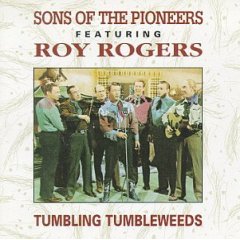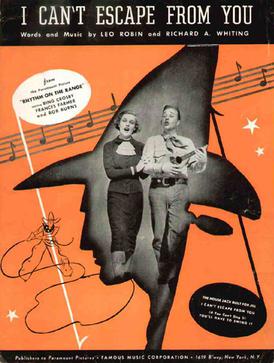Related Research Articles

"Back in Your Own Back Yard" is a popular song. Officially the credits show it as written by Al Jolson, Billy Rose, and Dave Dreyer; in fact, Billy Rose was exclusively a lyricist, Dreyer a composer, and Al Jolson a performer who was often given credits so he could earn some more money, so the actual apportionment of the credits would be likely to be music by Dreyer, lyrics by Rose, and possibly some small contribution by Jolson.
"Forever and Ever" is a popular song, from a German song, "Fliege mit mir in die Heimat" written by the Austrian songwriter Franz Winkler. It was adopted by the German Luftwaffe as their song during World War II. The English lyrics were written by Malia Rosa in 1948. It was originally recorded by Gracie Fields with Robert Farnon's Orchestra on 23 October 1948 and released on Decca F9031. Her version was subsequently released in the USA on London 362 and it charted briefly in 1949.
"Prisoner of Love" is a 1931 popular song, with music by Russ Columbo and Clarence Gaskill and lyrics by Leo Robin.
"Painting the Clouds with Sunshine" is a popular song published in 1929. The music was written by Joe Burke and the lyrics by Al Dubin for the 1929 musical film Gold Diggers of Broadway when it was sung by Nick Lucas. Gold Diggers of Broadway is a partially lost film, and the scene featuring the song is one of the only surviving scenes of the movie.
"Deep in the Heart of Texas" is an American popular song about Texas.

"By the Light of the Silvery Moon" or "By the Light of the Silv'ry Moon" is a popular love song. The music was written by Gus Edwards, and the lyrics by Edward Madden. The song was published in 1909 and first performed on stage by Lillian Lorraine in the Ziegfeld Follies of 1909. It was one of a series of moon-related Tin Pan Alley songs of the era. The song was also used in the short-lived Broadway show Miss Innocence when it was sung by Frances Farr.
"The One I Love (Belongs to Somebody Else)" is a popular song composed by Isham Jones with lyrics by Gus Kahn. The song was recorded by Isham Jones' Orchestra on December 21, 1923, at Brunswick Studios in New York City, and published on January 7, 1924. On January 17 in Chicago, Jones recorded another version, with Al Jolson on lead vocals. Both versions made the charts that Spring, with Jolson's peaking at number 2, and Jones' at number 5. Sophie Tucker recorded her version February 1924, released on Okeh 40054.
"Don't Take Your Love from Me" is a popular song written by Henry Nemo and published in 1941. Mildred Bailey first recorded this song in 1940 before publication. It was introduced that year by singer Joan Brooks.
"It Could Happen to You" is a popular standard with music by Jimmy Van Heusen and lyrics by Johnny Burke. The song was written in 1943 and was introduced by Dorothy Lamour in the Paramount musical comedy film And the Angels Sing (1944).
"I Had the Craziest Dream" is a popular song which was published in 1942. The music was written by Harry Warren, the lyrics by Mack Gordon.

"I May Be Wrong " is a popular song. The music was written by Henry Sullivan, the lyrics by Harry Ruskin, arranged by Dan Daugherty, and the original music publisher was Ager, Yellen, and Bornstein, Inc. The song was published in 1929 and it was included in the musical revue Murray Anderson's Almanac which ran for 69 performances at Erlanger's Theatre on Broadway in 1929. It is said that the song was written on-demand for John Murray Anderson.

"Somebody Loves Me" is a popular song, with music written by George Gershwin, and lyrics by Ballard MacDonald and Buddy DeSylva. The song was published in 1924 and featured in George White's Scandals of 1924.

"Nobody's Sweetheart", also known as "Nobody's Sweetheart Now" and "You're Nobody's Sweetheart Now", is a popular song, written in 1924, with music by Billy Meyers and Elmer Schoebel, and lyrics by Gus Kahn and Ernie Erdman. The song is a jazz and pop standard.

"Out of Nowhere" is a popular song composed by Johnny Green with lyrics by Edward Heyman and published by Famous Music. It was popularized by Bing Crosby, and was the first recording under his Brunswick Records contract. He recorded it on March 30, 1931 and it became his first number one hit as a solo artist. Crosby also sang it in the film Confessions of a Co-Ed (1931) and in his short film I Surrender Dear (1931). He recorded it again in 1954 for his album Bing: A Musical Autobiography.

"Tumbling Tumbleweeds" is a Western music song composed by Bob Nolan, a founding member of the Sons of the Pioneers. Nolan wrote the song in the early 1930s while he was working as a caddy and living in Los Angeles. It was first recorded by the Sons of the Pioneers in 1934, and it became one of the most famous songs associated with the group. Originally titled "Tumbling Leaves", the song was reworked into the title "Tumbling Tumbleweeds" and into more widespread fame with the 1935 film of the same name starring Gene Autry. Members of the Western Writers of America chose it as one of the Top 100 Western songs of all time.
Liza (All the Clouds'll Roll Away)" is a song composed by George Gershwin with lyrics by Ira Gershwin and Gus Kahn. It was introduced in 1929 by Ruby Keeler (as Dixie Dugan) in Florenz Ziegfeld's musical Show Girl. The stage performances were accompanied by the Duke Ellington Orchestra. On the show's opening night in Boston on June 25, 1929, Keeler's husband and popular singer Al Jolson suddenly stood up from his seat in the third row and sang a chorus of the song, much to the surprise of the audience and Gershwin himself. Jolson recorded the song a few days later on July 6, 1929, and his rendition rose to number nine on the charts of the day.
"Sioux City Sue" is a 1945 song and a 1946 movie. Lyricist Ray Freedman and composer Dick Thomas wrote the song. Thomas recorded the song in February 1945 for National Records and it was a number one Country charts hit for him. The song was Thomas' first chart entry on the Juke Box Folk Records chart and was also his most successful release: "Sioux City Sue" spent four weeks at number one on the Country charts during a stay of twenty-three weeks. The Dick Thomas version also reached Billboard's Best-selling Record charts attaining the No. 16 position.
"For You" is a song written by Joe Burke and Al Dubin in 1930. It was introduced in the Mack Sennett short Billboard Girl (1932) when it was sung by Bing Crosby. The best known version was from musician Rick Nelson in 1964, when it peaked at #6 on the Billboard Hot 100 and at #66 on the year end.

"I Can't Escape from You" is a song written music by Richard A. Whiting and lyrics by Leo Robin for the 1936 Paramount Film "Rhythm on the Range", and first introduced in the film when Bing Crosby sang it to Frances Farmer. Crosby recorded it for Decca Records that same year with the Jimmy Dorsey Orchestra and it was in the hit parade for 11 weeks reaching a peak position of No. 7. Crosby recorded the song again in 1954 for his album Bing: A Musical Autobiography.
"The Lamplighter's Serenade" is a song written by Hoagy Carmichael (music) and Paul Francis Webster (lyrics). The construction of the song was unusual and did not conform to the normal AABA pattern. Instead, Carmichael used an ABA format that proved most effective.
References
- ↑ "Internet Movie Database". imdb.com. Retrieved January 28, 2018.
- ↑ "Pop Chronicles 1940s Program #12". 1972.
- ↑ "The Online Discographical Project". 78discography.com. Retrieved January 28, 2018.
- 1 2 Whitburn, Joel (1973). Top Pop Records 1940-1955. Record Research.
- ↑ "The Online Discographical Project". 78discography.com. Retrieved January 28, 2018.
- ↑ "The Online Discographical Project". 78discography.com. Retrieved January 28, 2018.
- ↑ "Perry Como Discography". kokomo.ca. Retrieved January 28, 2018.
- ↑ "Bing Crosby discography". bingmagazine.co.uk. Retrieved January 28, 2018.
- ↑ "Discogs.com". Discogs.com. 1960. Retrieved January 28, 2018.
- ↑ "Discogs.com". Discogs.com. 1969. Retrieved January 28, 2018.